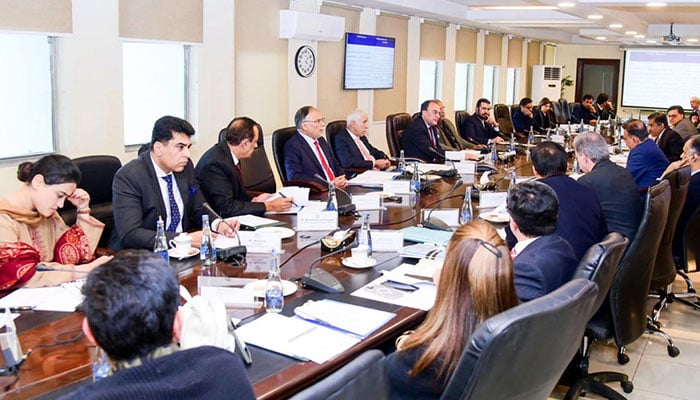Shalimar recording company not strategic asset: cabinet panel
CCOSOE states categorically that RBC could not be classified as strategic or essential entity in public sector
ISLAMABAD: The Cabinet Committee on State Owned Enterprises (CCOSOEs) on Tuesday refused to entertain the request of the Ministry of Information & Broadcasting to abandon its decision to privatize the Shalimar Recording and Broadcasting Company (SRBC). The CCOSOE stated categorically that the SRBC could not be classified as a strategic or essential entity in the public sector.
Federal Minister for Finance and Revenue Senator Muhammad Aurangzeb chaired a meeting of the Cabinet Committee on State-Owned Enterprises (CCOSOEs) at the Finance Division on Tuesday. The CCOSOEs deliberated on a summary presented by the Ministry of Information and Broadcasting (MoIB) regarding the privatization and exploration of a Public-Private Partnership (PPP) model for the Shalimar Recording and Broadcasting Company Limited (SRBC). During the discussion, the Cabinet Committee reiterated its earlier decision that organizations like SRBC will not be classified as strategic or essential. The MoIB will be required to abide by the Cabinet’s earlier decision regarding non-essential and non-strategic SOEs.
The sources said that there was a general trend prevailing in many ministries that they consider all public sector entities as strategic and essential so everyone had come into the meeting to defend and ensure survival of SOEs which were causing hefty losses to the national exchequer.
The estimated losses of SOEs stood in the range of Rs800 to Rs1000 billion on per annual basis. The finance minister has adopted an approach to raise questions in case of all ministries and entities that what are the justifications for their survival and if they could not give any appropriate response the entity would be classified as non-essential and non-strategic.
In addition, the Committee reviewed the implementation status of decisions previously taken regarding various SOEs under the agendas of the Cabinet Division, Ministry of Information and Broadcasting, Ministry of Petroleum, Ministry of Railways, and Revenue Division.
A presentation was given highlighting the six cases currently under implementation across these ministries, with two cases pertaining to the Cabinet Division and one each for the others. The review emphasized ensuring timely execution of all decisions.
The sources said that it was observed that no ministry took a stance that the decision would not be implemented and they informed the forum about a phased approach to implement all decisions. However, there were impressions that some ministries and attached departments raised unnecessary issues to create stumbling blocks in the way for smooth implementation of CCOSOEs decisions taken in the last few months.
-
 Woman Calls Press ‘vultures’ Outside Nancy Guthrie’s Home After Tense Standoff
Woman Calls Press ‘vultures’ Outside Nancy Guthrie’s Home After Tense Standoff -
 Allison Holker Gets Engaged To Adam Edmunds After Two Years Of Dating
Allison Holker Gets Engaged To Adam Edmunds After Two Years Of Dating -
 Prince William Prioritises Monarchy’s Future Over Family Ties In Andrew Crisis
Prince William Prioritises Monarchy’s Future Over Family Ties In Andrew Crisis -
 Timothée Chalamet Turns Head On The 'show With Good Lighting'
Timothée Chalamet Turns Head On The 'show With Good Lighting' -
 Bucks Vs Thunder: Nikola Topic Makes NBA Debut As Milwaukee Wins Big
Bucks Vs Thunder: Nikola Topic Makes NBA Debut As Milwaukee Wins Big -
 King Charles Breaks 'never Complain, Never Explain' Rule Over Andrew's £12 Million Problem
King Charles Breaks 'never Complain, Never Explain' Rule Over Andrew's £12 Million Problem -
 Casey Wasserman To Remain LA Olympics Chair Despite Ghislaine Maxwell Ties
Casey Wasserman To Remain LA Olympics Chair Despite Ghislaine Maxwell Ties -
 Shaun White Is Back At The Olympics But Not Competing: Here’s Why
Shaun White Is Back At The Olympics But Not Competing: Here’s Why -
 Breezy Johnson Engaged At Olympics After Emotional Finish Line Proposal
Breezy Johnson Engaged At Olympics After Emotional Finish Line Proposal -
 King Charles Wants Andrew To 'draw A Line' Under Epstein Issue
King Charles Wants Andrew To 'draw A Line' Under Epstein Issue -
 John Wick Game Confirmed With Keanu Reeves And Lionsgate Collaboration
John Wick Game Confirmed With Keanu Reeves And Lionsgate Collaboration -
 Gigi Hadid Feels 'humiliated' After Zayn Malik's 'pathetic' Comment: Source
Gigi Hadid Feels 'humiliated' After Zayn Malik's 'pathetic' Comment: Source -
 Olympics Men Hockey Game: McDavid, Crosby Power Canada Past Czechia
Olympics Men Hockey Game: McDavid, Crosby Power Canada Past Czechia -
 Sony PlayStation State Of Play Reveals 'Castlevania' And 'Metal Gear' Return
Sony PlayStation State Of Play Reveals 'Castlevania' And 'Metal Gear' Return -
 Ontario Tuition Freeze Ends, Allowing Colleges And Universities To Raise Fees
Ontario Tuition Freeze Ends, Allowing Colleges And Universities To Raise Fees -
 King Charles Should Apologise To All Rape Victims, Says New Poll
King Charles Should Apologise To All Rape Victims, Says New Poll




